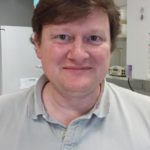Lien vers Pubmed [PMID] – 18086297
Malar. J. 2007 Dec;6:164
BACKGROUND: The antimalarial drug atovaquone specifically targets Plasmodium falciparum cytochrome b (Pfcytb), a mitochondrial gene with uniparental inheritance. Cases of resistance to atovaquone associated with mutant Pfcytb have been reported, justifying efforts to better document the natural polymorphism of this gene. To this end, a large molecular survey was conducted in several malaria endemic areas where atovaquone was not yet in regular use.
METHODS: The polymorphism of the Pfcytb was analysed by direct sequencing of PCR products corresponding to the full length coding region. Sequence was generated for 671 isolates originating from three continents: Africa (Senegal, Ivory Coast, Central African Republic and Madagascar), Asia (Cambodia) and South America (French Guiana).
RESULTS: Overall, 11 polymorphic sites were observed, of which eight were novel mutations. There was a large disparity in the geographic distribution of the mutants. All isolates from Senegal, Central African Republic and Madagascar displayed a Camp/3D7 wild type Pfcytb sequence, as did most samples originating from Cambodia and Ivory Coast. One synonymous (t759a at codon V253V) and two non-synonymous (t553g and a581g at codons F185V and H194R, respectively) singletons were detected in Ivory Coast. Likewise, two synonymous (a126t and c793t at codons -T42T and L265L, respectively) singletons were observed in Cambodia. In contrast, seven mutated sites, affecting seven codons and defining four mutant haplotypes were observed in French Guiana. The wild type allele was observed in only 14% of the French Guiana isolates. The synonymous c688t mutation at position L230L was highly prevalent; the most frequent allele was the c688t single mutant, observed in 84% of the isolates. The other alleles were singletons (a126t/a165c, a4g/a20t/a1024c and a20t/t341c/c688t corresponding to T42T/S55S, N2D/N71I/I342L, N71I/L114S/L230L, respectively” please replace with ‘ corresponding to T42T/S55S, N2D/N71I/I342L and N71I/L114S/L230L, respectively). The codon 268 polymorphisms associated with atovaquone resistance were not observed in the panel the isolates studied. Overall, the wild type PfCYTb protein isoform was highly predominant in all study areas, including French Guiana, suggesting stringent functional constraints.
CONCLUSION: These data along with previously identified Pfcytb field polymorphisms indicate a clustering of molecular signatures, suggesting different ancestral types in South America and other continents. The absence of mutations associated with most atovaquone-proguanil clinical failures indicates that the atovaquone-proguanil association is an interesting treatment option in the study areas.




